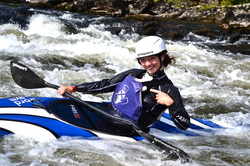
On Friday my coach Neil Caffrey added a new dimension to my training for me to think about, using a short course of six gates. They were simple gates, for the technique I usually use, which involves a lot of fancy twisting and turning and ducking under the poles. The point emphasised by this session was the necessity of turning strokes. It turns out I need a lot fewer than I thought - in fact the whole session revolved around not using ANY turning strokes between the upstream gates at all. Actually stopping myself from using strokes like bow rudders or sweeps was incredibly frustrating, as by reflex I use them constantly. Neil said it reflects the level of confidence a paddler has in their ability, because by finding it hard to refrain from using turning strokes I was demonstrating my lack of knowledge. Knowledge of what would happen if I just kept paddling between the gates. Which of course is a lot quicker, when every stroke is directed at pushing your weight forwards, instead of changing direction.
The trick to this session is to plan ahead more than usual. It's very easy in slalom to decide to come wide on every single gate, giving yourself plenty of time to manoeuvre and focus on the next gate. Irritatingly enough this isn't the fastest method - by quite a margin. By practising this course hundreds of times during the session, myself and my teammates began to understand that you can plan down to a very fine degree where to come wide on the gates. Getting it consistently was the problem! It felt a lot like I would put down one good run, where I understood perfectly where my strokes were going to be, and was ready for them before the gates. Then the next run down I would flail and splash and hit every single pole on the course. Neil told me that because we race, we automatically want to become faster - so when I put in a good run, my next mental step was to try and speed up. This demonstrated to me the need for practising consistently, instead of just hammering out faster and faster runs.
Throughout my slalom career, more than a few people have told me that it is a 'thinking person's sport'. The more I progress with my training, the more I can agree. It feels like the more I learn, the wider my perception becomes, and I realise how much more there is to understand.
 RSS Feed
RSS Feed
